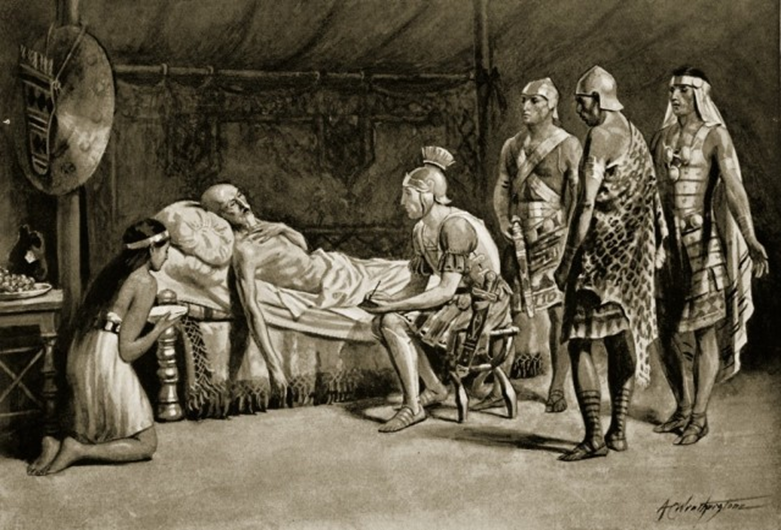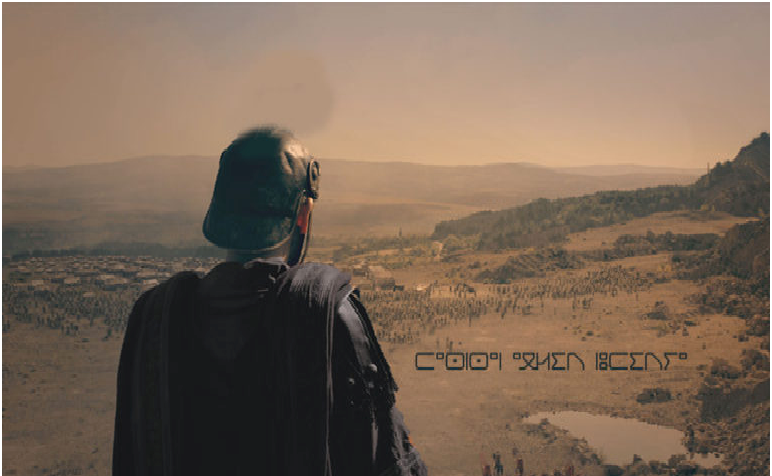aglid Messinissa

The king of Numidia is on his deathbed
Imaginary pictures of King Messenisa on his deathbed, and sitting in front of him is the Roman commander (Askipo), who is dressed in war clothes, listening to the old king as he asks him to divide his kingdom of Numidia between his three sons who appear in the picture and they are (Makibasa, Glossa, and Mustanbal) and they are wearing war clothes, one of them wearing The skin of a leopard is evidence of strength and ferocity, the other is a cloak that extends from the head to below the knee, the third carries a Roman-style sword, and a woman, perhaps a slave, sat in the service of the elderly king, carrying a dish, perhaps containing water, a picture drawn by the British artist. (A.C. Weatherstone) (1888-1929) AD Bridgeman Art Library.
aglid Messenissa (238-148) BC, the elderly king of Numidia and the leader of the Massaesyli tribe, which lived near Cirta (Constantine in Algeria). Numidia was part of the northern Sahara, and its borders sometimes extended From western modern Tunisia to eastern Algeria, when Messenissa allied with the Romans in the year (206) BC during the Second Roman-Punic War (218-201) BC, he was granted more lands extending up to the Mulucha River (Mulucha River). In eastern Morocco), he also participated in the beginning of the Third Roman-Punic War (149-146) BC. He was able to penetrate the Al-Jifara plain in western Tripoli, which was areas belonging to Carthage, while the Carthaginians were suffering from the siege of the Roman forces and their inability to win.
The Amazighan king was diligent in providing assistance to the Romans, and adding other possessions to the Kingdom of Numidia. Thus, it can be said that establishing a sprawling state that embraces a people of one lineage is much more difficult than its downfall. Events later proved this. With the intensification of battles between the Romans and Carthaginians, Messenisa died in the year (148 AD). (B.C.) at the age of 83 years, and since his loyalty was with the Roman Empire during the Roman-Punic (or Punic) War, he had a good relationship with Cornelius Scipio Aemilianus Africanus (the title of Africanus means Africanus ) The Roman commander who was leading the siege of Carthage (149-146) BC (in Tunisia) and who was present or perhaps visited him before his death, so Messenisa asked the leader Eskipo to divide a kingdom between his three sons, Micipsa and Gulussa. And Mastanabal, This allowed Rome to impose control over Numidia, and ultimately led to a miserable family feud between the three brothers.
The interest of Messenisa required a change of loyalty from the Kingdom of Carthage to the Romans after the Second Roman-Punic War. He knew that Carthage was inevitably dooming him, while Rome had the power and ability to constantly prepare military campaigns. On the other hand, a change of loyalty was necessary for those who added more possessions to the land, which Numidia was brought to the Moulouya River (eastern Morocco), and Rome also helped him get rid of his rival Sfax, where he was captured and transferred to Rome. Messenissa occupied the city of Cirta (currently Constantine), and found the wife of his rival (Sophoisha). In order to occupy the position and leadership of Sfax, he married the woman of his rival. Previously, however, the matter did not please Commander Asqibo, so he ordered him to hand her over to the Romans. All of Messenisa was not able to send her a cup of poison, so she died and he was freed from the predicament in which he had fallen.
In general, the Romans welcomed cooperation with him on the principle (there are no permanent friends, no permanent enemies, but permanent interests). The Roman doctrine requires cooperation with Messinissa, but not for the long term. The mistake that the barbarian Aglaid made was that he divided his emerging kingdom between his three sons, and this in itself is a major mistake in ancient history. We have experiences with dividing the kingdom between brothers. For example, Esarhaddon, the Assyrian king, divided the Assyrian kingdom between his sons, so Ashurbanipal became king of Assyria, and his brother Shamsh-shum-ukun became king of Babylon. A war took place between the two brothers, leading to the killing of the king of Babylon. Likewise, in the Abbasid era, after the death of Caliph Harun al-Rashid, a war occurred. between the two brothers Al-Amin and Al-Mamun and ended with the killing of Caliph Al-Amin. Naturally, the division would make Rome the solution to the conflict between the three brothers. She chooses those who follow her and offer loyalty to her, and this is what actually happened.

Whatever the mistakes, there must be good deeds in Mennessa. The Greek historian Polybius described Menessa, king of Numidia, when he wrote extensively about the Punic Wars. Polybius was also famous for his meeting with King Menessa, and said about him: (The best man among all the kings of our time), and he also wrote: (His greatest and most important achievement came after his control of Numidia, which before his time had not been productive on a global scale, and was seen as incapable of producing any cultivated fruits. Messenis was the first and only man to show that Numidia could produce cultivated fruits exactly like Any other country), and in the following ce
nturies Numidia became known as (the breadbasket of Rome), and just as Rome eliminated Carthage, any rebellion or disobedience from the kings of Numidia was also doomed to death, imprisonment, or exile to Rome. It does not matter whether you are a collaborator or even a rebel against Roman sovereignty, but what is important is that Rome is the undisputed master of the Mediterranean world.
Source: websites

